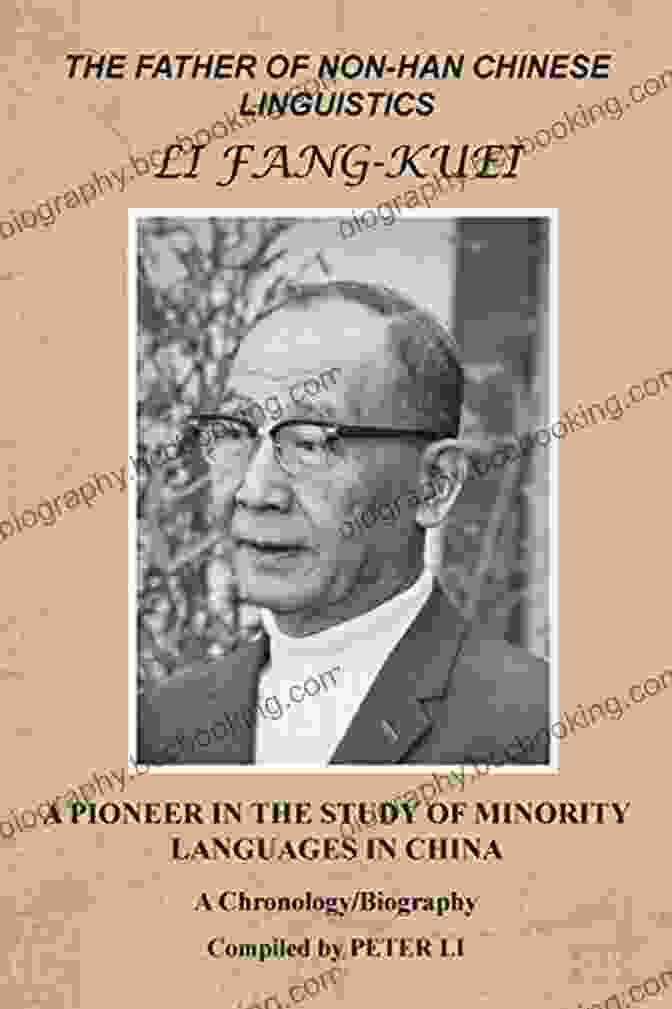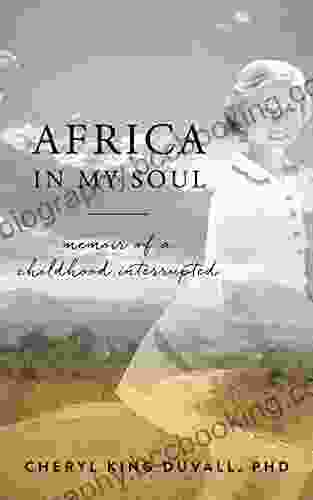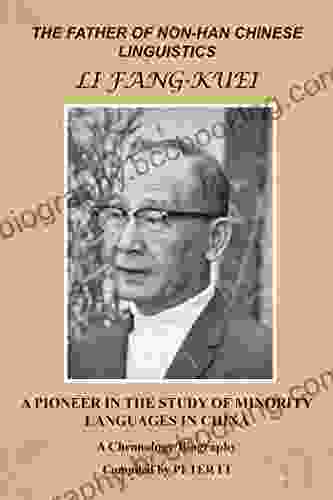The Father of Non-Han Chinese Linguistics: Li Fang Kuei

5 out of 5
| Language | : | English |
| File size | : | 15210 KB |
| Text-to-Speech | : | Enabled |
| Screen Reader | : | Supported |
| Enhanced typesetting | : | Enabled |
| Word Wise | : | Enabled |
| Print length | : | 234 pages |
In the realm of linguistics, the name Li Fang Kuei looms large as a towering figure. As the pioneer of non-Han Chinese linguistics, his groundbreaking work laid the foundation for our understanding of the diverse languages spoken by non-Han Chinese ethnic groups in China and beyond. His legacy continues to inspire scholars and shape the field to this day.

Early Life and Education
Li Fang Kuei was born in 1902 in a small village in Guangdong province, China. From a young age, he demonstrated an extraordinary aptitude for languages, mastering several local dialects by the time he was a teenager. His passion for linguistics led him to pursue higher education at Peking University, where he studied under renowned linguist Luo Changpei.
Luo Changpei's influence on Li Fang Kuei was profound. Luo was a pioneer in the study of non-Han Chinese languages, and his emphasis on fieldwork and rigorous linguistic analysis deeply resonated with Li. Inspired by Luo's teachings, Li embarked on numerous linguistic expeditions to remote areas of China, documenting and analyzing the languages of various ethnic groups.
Major Linguistic Contributions
Li Fang Kuei's linguistic contributions are vast and far-reaching, spanning several decades of groundbreaking research. His work has had a transformative impact on our understanding of non-Han Chinese languages, particularly in the areas of historical linguistics, comparative linguistics, and language documentation.
Historical Linguistics
Li Fang Kuei's historical linguistic research focused on reconstructing the ancestral forms of non-Han Chinese languages and tracing their historical development. He developed innovative methods for comparing and analyzing different languages, enabling him to identify shared patterns and propose plausible hypotheses about their origins and relationships.
One of Li's most significant contributions in this area was his work on the Tai-Kadai language family. He demonstrated the genetic relationship between various Tai languages spoken in Southeast Asia and China, providing crucial evidence for the existence of this distinct language family.
Comparative Linguistics
Li Fang Kuei's comparative linguistic studies sought to identify similarities and differences between non-Han Chinese languages. He compared phonological systems, morphological structures, and syntactic patterns, uncovering shared features and patterns that shed light on the historical development and diversity of these languages.
A notable example of his comparative work is his study of the Hmong-Mien languages. He identified striking similarities between the Hmong and Mien languages, suggesting a common origin for these two branches of the Hmong-Mien language family.
Language Documentation
Li Fang Kuei recognized the importance of documenting endangered and understudied languages. He conducted extensive fieldwork in remote areas, meticulously recording and analyzing the languages of various ethnic groups. His documentation efforts have preserved invaluable linguistic data that has served as a foundation for subsequent research and revitalization efforts.
One of Li's most notable documentation projects was his work on the Austroasiatic languages spoken in southern China. He collected a vast corpus of data from several Austroasiatic languages, providing invaluable insights into the diversity and complexity of this language family.
Academic Career and Legacy
Li Fang Kuei's academic career spanned several decades, during which he held prestigious positions at Peking University and the Institute of Linguistics of the Chinese Academy of Sciences. He trained a generation of linguists who carried on his legacy and advanced the field of non-Han Chinese linguistics.
Li Fang Kuei's influence extended beyond China's bFree Downloads. He collaborated with scholars from around the world, fostering international cooperation in the study of non-Han Chinese languages. His work has had a profound impact on the field of linguistics globally, earning him recognition as one of the most influential linguists of the 20th century.
Li Fang Kuei passed away in 1987, leaving behind a rich legacy of scholarship and a lasting impact on the field of non-Han Chinese linguistics. His work continues to inspire and guide scholars, and his contributions will undoubtedly continue to shape our understanding of language diversity and evolution for generations to come.
Li Fang Kuei's pioneering work as the father of non-Han Chinese linguistics has indelibly transformed our understanding of the diverse languages spoken by non-Han Chinese ethnic groups. His groundbreaking contributions in historical linguistics, comparative linguistics, and language documentation have laid the foundation for subsequent research and shaped the field in countless ways.
Li Fang Kuei's legacy extends far beyond his own lifetime. His work continues to inspire scholars and guide research into the diverse languages of the world. As we delve deeper into the intricacies of human language, we owe a debt of gratitude to Li Fang Kuei, whose pioneering spirit and unwavering dedication to linguistic exploration have enriched our understanding of the human experience.
References
- Li Fang Kuei: A Pioneer in Non-Han Chinese Linguistics. jstor.org/stable/41262964
- Li Fang Kuei and the Non-Han Languages of China. cambridge.org/core/journals/china-quarterly/article/abs/li-fang-kuei-and-the-nonhan-languages-of-china/E8F469F7979B0D545F422463B93A4FE3
- The Linguistic Legacy of Li Fang Kuei. degruyter.com/document//10.1515/9783110283777/html
5 out of 5
| Language | : | English |
| File size | : | 15210 KB |
| Text-to-Speech | : | Enabled |
| Screen Reader | : | Supported |
| Enhanced typesetting | : | Enabled |
| Word Wise | : | Enabled |
| Print length | : | 234 pages |
Do you want to contribute by writing guest posts on this blog?
Please contact us and send us a resume of previous articles that you have written.
 Book
Book Novel
Novel Page
Page Chapter
Chapter Text
Text Story
Story Genre
Genre Reader
Reader Library
Library Paperback
Paperback E-book
E-book Magazine
Magazine Newspaper
Newspaper Paragraph
Paragraph Sentence
Sentence Bookmark
Bookmark Shelf
Shelf Glossary
Glossary Bibliography
Bibliography Foreword
Foreword Preface
Preface Synopsis
Synopsis Annotation
Annotation Footnote
Footnote Manuscript
Manuscript Scroll
Scroll Codex
Codex Tome
Tome Bestseller
Bestseller Classics
Classics Library card
Library card Narrative
Narrative Biography
Biography Autobiography
Autobiography Memoir
Memoir Reference
Reference Encyclopedia
Encyclopedia Candace Savage
Candace Savage C W Lockhart
C W Lockhart Carl Menger
Carl Menger Captain D Michael Abrashoff
Captain D Michael Abrashoff Byron L Dorgan
Byron L Dorgan Catherine Belknap
Catherine Belknap Carrie Hope Fletcher
Carrie Hope Fletcher Brianna York
Brianna York Cameron Stewart
Cameron Stewart Carrie Severson
Carrie Severson Brooke Knight
Brooke Knight Carol Ann Gillespie
Carol Ann Gillespie Carol Dulis
Carol Dulis Budd Coates
Budd Coates Brent Dykes
Brent Dykes Bruce Boudreau
Bruce Boudreau Candy J Cooper
Candy J Cooper Cai Chongda
Cai Chongda Casey Crosbie
Casey Crosbie Carlotta Gall
Carlotta Gall
Light bulbAdvertise smarter! Our strategic ad space ensures maximum exposure. Reserve your spot today!
 Demetrius CarterFollow ·6.2k
Demetrius CarterFollow ·6.2k Elmer PowellFollow ·16k
Elmer PowellFollow ·16k Alfred RossFollow ·10.6k
Alfred RossFollow ·10.6k Jared NelsonFollow ·4.4k
Jared NelsonFollow ·4.4k Matt ReedFollow ·8.2k
Matt ReedFollow ·8.2k Clarence BrooksFollow ·17.2k
Clarence BrooksFollow ·17.2k Ryūnosuke AkutagawaFollow ·8.4k
Ryūnosuke AkutagawaFollow ·8.4k Gil TurnerFollow ·5.5k
Gil TurnerFollow ·5.5k

 Andy Hayes
Andy HayesUnveil the Rich Tapestry of Rural Life: Immerse Yourself...
Step into the enchanting pages of "Still...

 David Mitchell
David MitchellUnlocking the Depths of Cybersecurity: An In-Depth Look...
In the ever-evolving landscape of...

 Seth Hayes
Seth HayesUnlock the Secrets of Watercolor Landscapes: 37 Tools for...
Embark on a...

 Tyler Nelson
Tyler Nelson15 Insightful Answers to Questions on Uterine Fibroid
Uterine fibroids...

 Evan Hayes
Evan HayesAfrica In My Soul: A Literary Odyssey That Captivates the...
In a world where diverse cultures...
5 out of 5
| Language | : | English |
| File size | : | 15210 KB |
| Text-to-Speech | : | Enabled |
| Screen Reader | : | Supported |
| Enhanced typesetting | : | Enabled |
| Word Wise | : | Enabled |
| Print length | : | 234 pages |














